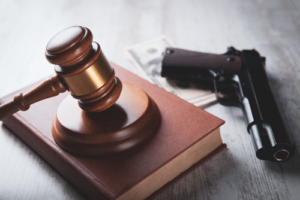Legally Reviewed By:
Brian P. Gabriel, Esquire
 In the United States, politicians have long battled to retain the balance of correcting the country’s pressing mass shooting problem while still respecting Second Amendment rights. Some states, including Florida, have decided to help nullify the issue by enacting Risk Protection Orders (RPOs). Also known as “red flag gun laws,” their intention is to keep firearms out of the hands of people who might have ill intentions.
In the United States, politicians have long battled to retain the balance of correcting the country’s pressing mass shooting problem while still respecting Second Amendment rights. Some states, including Florida, have decided to help nullify the issue by enacting Risk Protection Orders (RPOs). Also known as “red flag gun laws,” their intention is to keep firearms out of the hands of people who might have ill intentions.
As more and more states write their own version these types of regulations into law, many gun rights advocates are unhappy. The National Rifle Association (NRA) contends that RPOs are depriving American citizens of their fundamental right to due process. So, what exactly are Risk Protection Orders, and how do they work in Florida?
Understanding How Risk Protection Orders (RPOs) Work In Florida
Risk Protection Orders in Florida permit the confiscation of firearms from a person who is considered to be a danger to themself or others. Most often, RPOs are requested by friends or family members who have concerns about the individual’s safety or intentions. Police officers also have the ability to file a petition if they believe someone is a threat.
When an RPO firearm confiscation is approved, the court will issue an order that allows the police officers to temporarily confiscate the weapon(s). How long the firearm(s) will be taken away is dependent on the circumstances surrounding their case. In the meantime, the individual will also be prohibited from purchasing or possessing any guns.
National Public Radio (NPR) reported in 2019 that over a period of 1½ years, Florida courts had sanctioned 2,500 risk protection orders to confiscate firearms. That equates to a rate of about five people each day who had their firearms seized due to RPOs, which is more than any of the other 17 states that have adopted similar regulations.
What To Expect from a Risk Protection Order (RPO) Hearing in Florida
In order to request an RPO, a hearing will be held where the court will need to be given evidence that the individual in question has committed one or more of the following actions within the last year:
- Acquired a firearm or ammunition
- Attempted or threatened to harm another person with a firearm
- Attempted or threatened to kill themselves with a firearm
- Stalked someone
- Violated a protective order
Documentation of a mental illness or previous conviction for domestic violence may be used as evidence, as well as testimony from the respondent’s family or a household member. A final order cannot be issued by a judge until strong evidence has been provided showing that by possessing a firearm, the individual poses a danger to themself or others.
Respondents can plead their case by requesting an appeal of their RPO after it has been implemented. A Florida criminal defense attorney can submit a petition to the court to have your RPO vacated. This would prompt another hearing, allowing the respondent to provide evidence that contests the judge’s evaluation of the respondent. Evidence may include demonstrating that the respondent does not actually pose a risk to themself or others. This can include:
- Showcasing the individual’s involvement in the community,
- Debating that the individual’s actions were taken out of context, or
- Challenging the court’s concerns.
Unfortunately, overturning an RPO is extremely difficult without the help of a criminal defense attorney who has experience with these types of cases.
Contact a Florida Criminal Defense Attorney To Help Overturn a Risk Protection Order
Talk to Criminal Defense Attorney Brian Gabriel about your weapons offense. Start with a free consultation today by calling The Law Office of Gabriel & Gabriel at (561) 622-5575. With over 30 years of experience, you can rely on Mr. Gabriel to handle your case using all the knowledge and skill developed over the span of his career. You can also complete an online contact form to learn more.



